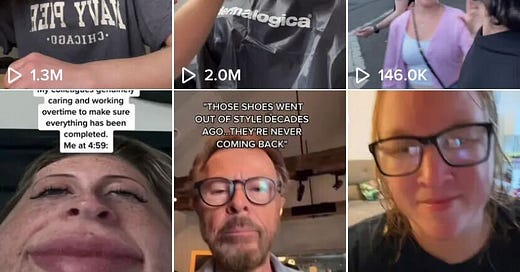TikTok is the town square now
You don't need Twitter or Instagram to keep current with news, discourse, memes, or trends anymore.
Embedded is your essential guide to what’s good on the internet, from Kate Lindsay and Nick Catucci.
Stay tuned for when I make this article into, you guessed it, a TikTok. —Kate
Whenever I tell someone I don’t scroll Twitter or Instagram anymore, I feel like I’ve just announced that I’m vegan at a dinner party. It’s a reasonable choice that I make for my health, and yet the admission makes me feel like a buzzkill. Sorry, I didn’t see the tweet where someone we don’t like said something we don’t agree with. Sounds interesting, tho!
I worried, in particular, that the choice would put me at a disadvantage in writing this newsletter. I had to accept that even if it did, that didn’t matter more than my own happiness. But while I haven’t scrolled Instagram Stories or looked at my Twitter feed in over a month, I still very much use TikTok. A lot of TikTok. So much TikTok I had to stop myself from blurting out “oh no, the condensation!” at a restaurant over the weekend, lest I violate my own “no quoting TikTok sounds in actual conversation” rule.
Something I’ve noticed, however, is that exclusively using TikTok doesn’t mean I’m only exposed to TikTok-specific trends and culture. In fact, many of the dust-ups from other platforms still make their way onto my For You page. Rather than a standalone platform, as it was in its early days, TikTok has become the ocean into which—and out of which—the streams of all the other platforms run. It’s no longer a corner of the internet, but the whole town square.
Many who don't use it still think of TikTok as a dancing app. But while it used to launch enough dances to fill a Jimmy Fallon segment, I've only seen TikTok spawn one massive dance in the past few months, for Lizzo’s “About Damn Time.” The TikTok of the past year has been all about trends—not huge, sweeping trends, but, as Terry Nguyen recently wrote, infinite overlapping moments that we’re nevertheless determined to name and categorize.
This is happening because TikTok is the closest we’ve gotten since the rise of Twitter to putting everyone in the world in the same room all at once. As a result, there are more conversations, memes, and bizarre recipes to keep up with than ever before. That’s why we’re all living like coastal grandmothers while also somehow welcoming back indie sleaze as fast fashion retailers push out low-rise jeans. But it’s not that trends are moving quickly: It’s that, as always, different people are doing different things. We’ve just never had such a holistic view of them, and our brains are trying to make sense of it all.
But TikTok isn't comparable only to Twitter. Like Pinterest, it’s outward-facing. It works in tandem with other platforms—as Rachel Karten recently noted, there are TikToks that are just round-ups of ideas for Instagram captions. There are photo editing tutorials and tips for getting a good Instagram picture. Also like Pinterest, TikTok works in service of real life. Many of the trends involve going somewhere, doing something with (or to) someone else, or trying something at home—like mixing balsamic vinegar and club soda to make “healthy Coke.” Sure, TikTok made you do it, but really, “TikTok” is just “popular culture.”
 Tiktok failed to load.
Tiktok failed to load.Enable 3rd party cookies or use another browser
And for everything else, there’s the green screen. This simple feature, which allows users to appear and talk over what are essentially embeds and screenshots, combines the image-first culture of Instagram with the heady analysis of Twitter, in video form. Articles, Reddit threads, paparazzi photos, blind items, even the bad tweet you wanted to show me—all of it ends up on TikTok, with someone’s crudely cookie-cuttered head providing analysis or even just an appropriately skeptical or excited or horrified expression.
I do think a healthier web is, in the words of Gita Jackson, “a series of sites to visit throughout the day instead of one huge central hub where we are all forced to be in a pile together.” That tweet is referring to Twitter, but TikTok is just a different, bigger pile. By participating in the internet, we make the internet. If TikTok is the new town square, can it be a means of aggregating and documenting culture without warping and poisoning it? That’s not really a question for TikTok—it’s a question for us.




